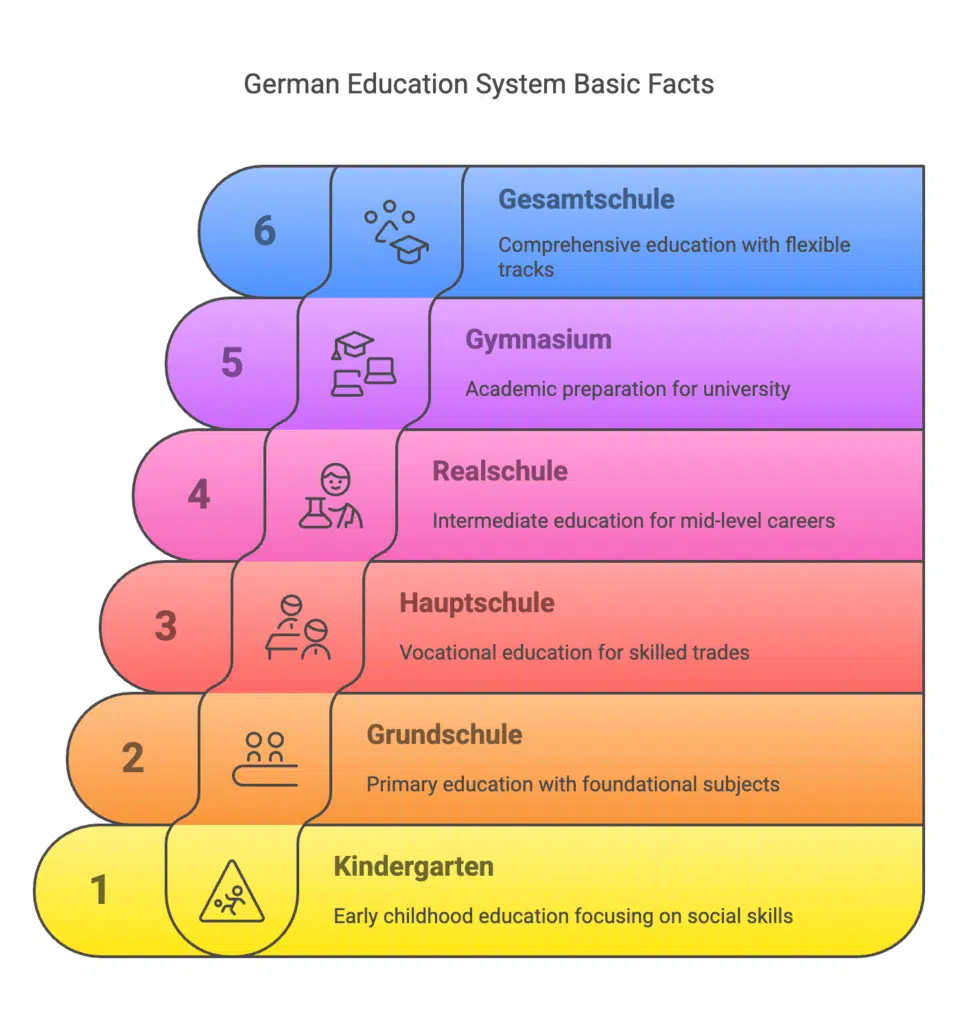Moving to Germany with children means learning how the German education system works. It can feel complex initially, but it gets easier to navigate once you understand the basics. Whether your kids are starting preschool or preparing for university, this guide helps you know what to expect.
Understanding the Structure: German Education System Basic Facts
The education system in the Federal Republic of Germany is built on structure and early tracking. Education is managed by each of the 16 federal states (Bundesländer), but there are shared national goals.

Schooling is compulsory from age 6 to 18. It starts with Grundschule (primary school), which usually lasts four years (six in some states). After that, students are placed into one of several secondary school types based on academic ability and teacher recommendations. These include:
Kindergarten (Ages 3-6): While not mandatory, most children attend kindergarten to develop social and basic educational skills.
Primary School (Grundschule, Age 6-10): Children aged 6-10 attend Grundschule, where foundational subjects like math, reading, writing, and basic sciences are taught.
Secondary Education: After Grundschule, students are placed into one of the following tracks based on their academic performance:
- Hauptschule (vocational focus): This track emphasizes practical education, preparing students for skilled trades or vocational training programs. It includes basic math, German, and vocational studies, often supplemented by internships.
- Realschule (intermediate education): Aimed at students pursuing mid-level professions, Realschule offers a broader curriculum than Hauptschule, including sciences, languages, and computer skills, paving the way for technical or administrative careers.
- Gymnasium (preparation for university): This academically intensive track prepares students for higher education. It features advanced sciences, humanities, and languages courses, culminating in the Abitur required for university admission.
- Gesamtschule (comprehensive school combining all tracks): This flexible School integrates elements of Hauptschule, Realschule, and Gymnasium, allowing students to switch between tracks based on their performance and interests.
One thing that might surprise expat parents is how early the school tracking begins. Your child’s school path is often set by age 10, which puts pressure on early academic performance.
There’s also a growing focus on early language learning. In places like Bavaria, kindergarteners (Kita) may take mandatory German tests before school starts, especially if they don’t speak German at home. If they need help, they’ll join special prep courses to catch up.
For many expat families, adjusting to the education system in Germany can be a real challenge. That’s especially true if your child doesn’t speak German or joins the system at an older age. Schools usually don’t wait for kids to catch up—they’re placed in classes based on age, not skill.
Big-city international schools often have programs like the International Baccalaureate (IB). These programs are helpful for children who may not stay in one place for long or for those who move between countries frequently.
Many families choose local schools to help their kids learn the language and fit in. This choice can lead to challenges at first, but it is usually beneficial in the long run. Support programs differ by state. Some states provide extra language help or transition classes for new students.
Language barriers often affect a child’s ability to attend Gymnasium, the academic high school. Studies show that children who don’t speak German at home are half as likely to be placed in a Gymnasium as monolingual peers. This shows the system’s heavy reliance on early language skills.
Rights and Inclusion: Protection Against Discrimination
Every child in Germany has the right to an education—regardless of nationality or background. The law offers protection against discrimination based on language, religion, or origin. Schools are expected to support integration and equality, but results often depend on the region and available resources.
Families from migrant backgrounds face challenges when navigating the German education system. Bureaucracy and inconsistent policies make it difficult for them to get the help they need, and many families must find solutions independently.
Parents are encouraged to be involved. Meet with teachers regularly, ask questions, and participate in school decisions. Most schools have parent councils where you can share concerns and suggest improvements. If language is an issue, please bring a translator or a friend.
Germany has school-based social workers and psychologists who help children manage stress, culture shock, and learning gaps. Like other public services, access to these services depends on location and staff availability.

